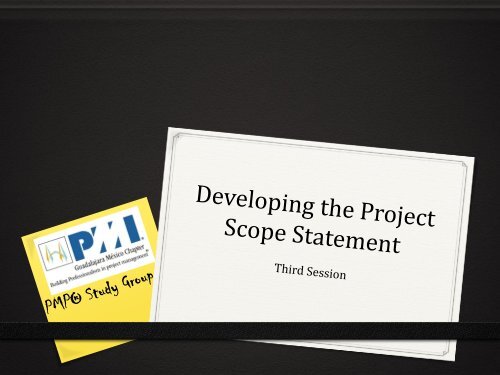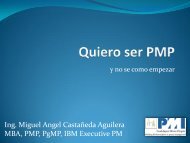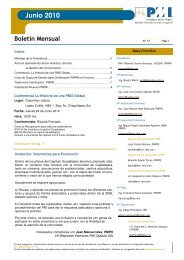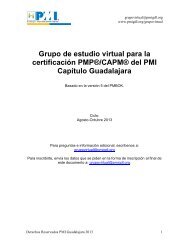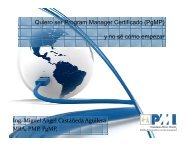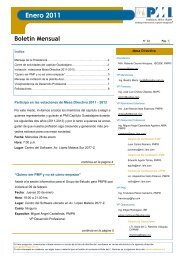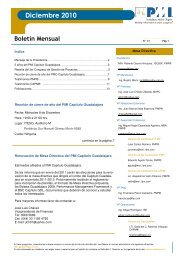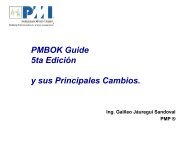0 - Project Management Institute
0 - Project Management Institute
0 - Project Management Institute
Create successful ePaper yourself
Turn your PDF publications into a flip-book with our unique Google optimized e-Paper software.
Agenda<br />
0 Instructor Introduction 3 minutes<br />
0 Agenda review 2 minutes<br />
0 Chapter of the week 50 minutes<br />
0 Q&A of chapter 10 minutes<br />
0 Break 10 minutes<br />
0 Exercises 25 minutes<br />
0 Round table 15 minutes<br />
0 Closure 5 minutes<br />
Developing the <strong>Project</strong> Scope<br />
Statement<br />
2
Content<br />
0 Develop <strong>Project</strong> <strong>Management</strong> Plan Process<br />
0 Collect Requirements Process<br />
0 Define Scope Process<br />
0 Create WBS Process<br />
Developing the <strong>Project</strong> Scope<br />
Statement<br />
Initiation Planification Execution Monitoring Closing 3
Develop <strong>Project</strong> <strong>Management</strong> Plan<br />
0 This process describes, integrates, and coordinates baselines and<br />
subsidiary plans for the processes determined to be used for a<br />
project.<br />
0 According to the PMBOK® Guide, it defines how the project is<br />
executed, how it’s monitored and controlled, and how it’s closed.<br />
It also documents the outputs of the planning group processes.<br />
Developing the <strong>Project</strong> Scope<br />
Statement<br />
Initiation Planification Execution Monitoring Closing<br />
4
Develop <strong>Project</strong> <strong>Management</strong> Plan<br />
<strong>Project</strong> <strong>Management</strong> Plan should include the following elements (but is not limited to them):<br />
0 Processes to be used to perform each phase of the project.<br />
0 The life cycle to be used for the project and for each phase.<br />
0 Tailoring results the project team will define.<br />
0 Methods for executing the work of the project to fulfill the objectives.<br />
0 Change management plan describing methods for monitoring and controlling change.<br />
0 Configuration management.<br />
0 Methods for determining and maintaining the validity of performance baselines.<br />
0 Communication needs of stakeholders and the techniques to fulfill those needs.<br />
0 <strong>Management</strong> reviews of content, issues, and pending decisions.<br />
0 Subsidiary plans.<br />
0 Other planning documents (e.g. Milestones list, resource calendar, schedule baseline, cost baseline, quality<br />
.(baseline baseline, Risk register, scope<br />
Developing the <strong>Project</strong> Scope<br />
Statement<br />
Initiation Planification Execution Monitoring Closing<br />
5
Collect Requirements Process<br />
0 The main purpose of this process is to define and document the<br />
project sponsor, the customer, and the stakeholder’s<br />
expectations and needs for meeting the project objective.<br />
Developing the <strong>Project</strong> Scope<br />
Statement<br />
Initiation Planification Execution Monitoring Closing<br />
6
Collect Requirements Process<br />
Requirements Documentation may include at least:<br />
0 Business need for the project and why it was undertaken<br />
0 <strong>Project</strong> objectives and business objectives the project hopes to fulfill<br />
0 Functional requirements<br />
0 Non-Functional requirements<br />
0 Quality requirements<br />
0 Acceptance Criteria<br />
0 Business rules<br />
0 Organizational areas and outside entities impacted<br />
0 Support and training requirements<br />
0 Assumptions and constrains<br />
0 * Signature of key stakeholders indicating acceptance of the requirements<br />
Developing the <strong>Project</strong> Scope<br />
Statement<br />
Initiation Planification Execution Monitoring Closing<br />
7
Define Scope<br />
0 Through this process it’s developed and documented detailed<br />
description of the deliverables of the project and the work<br />
needed to produce those deliverables.<br />
0 This process is progressively elaborated as more detail<br />
becomes known.<br />
Developing the <strong>Project</strong> Scope<br />
Statement<br />
Initiation Planification Execution Monitoring Closing<br />
8
Define Scope: tools & techniques<br />
Product Analysis: Is a method for converting<br />
the product description and project<br />
objectives into deliverables and requirements<br />
and might include:<br />
Alternatives Identification: Is a technique<br />
used for discovering different methods or<br />
ways of accomplishing the work of the<br />
project.<br />
• Value analysis<br />
• Functional analysis<br />
• Requirements analysis<br />
• System-engineering techniques<br />
• Systems analysis<br />
• Product breakdown<br />
• Value engineering techniques<br />
• Brainstorming<br />
• Lateral thinking<br />
Developing the <strong>Project</strong> Scope<br />
Statement<br />
Initiation Planification Execution Monitoring Closing<br />
9
Define Scope: outputs<br />
0 The purpose of the <strong>Project</strong> Scope Statement is to provide a common<br />
understanding of the project scope among stakeholders.<br />
0 It should include the following elements:<br />
0 Product Scope description<br />
0 Product acceptance criteria<br />
0 <strong>Project</strong> deliverables<br />
0 <strong>Project</strong> exclusion<br />
0 <strong>Project</strong> constrains<br />
0 <strong>Project</strong> assumptions<br />
0 Approval requirements are not an official component according to the<br />
PMBOK Guide. It refer to how the objectives, deliverables, documents<br />
and other outcomes of the project will be approved.<br />
Developing the <strong>Project</strong> Scope<br />
Statement<br />
Initiation Planification Execution Monitoring Closing<br />
10
Create WBS<br />
0 It’s a deliverable-oriented hierarchical decomposition of the<br />
work to be executed by the project team, to accomplish the<br />
project objectives and create the required deliverables.<br />
Developing the <strong>Project</strong> Scope<br />
Statement<br />
Initiation Planification Execution Monitoring Closing<br />
11
Create WBS<br />
Decomposition<br />
1. Identify the<br />
deliverables and<br />
work.<br />
2. Organize the<br />
WBS.<br />
3. Decompose the<br />
WBS components<br />
into lower-level<br />
components.<br />
4. Assign<br />
identification<br />
codes.<br />
5. Verify the WBS.<br />
Developing the <strong>Project</strong> Scope<br />
Statement<br />
Initiation Planification Execution Monitoring Closing<br />
12
Create WBS<br />
Decomposition<br />
<strong>Project</strong><br />
Phases<br />
Deliverables<br />
Work<br />
Packages<br />
•Output of<br />
Scope<br />
<strong>Management</strong><br />
Decomposition<br />
Decomposition<br />
Activities<br />
•Output of<br />
Time<br />
<strong>Management</strong><br />
Developing the <strong>Project</strong> Scope<br />
Statement<br />
Initiation Planification Execution Monitoring Closing<br />
13
Questions or comments<br />
Elapsed time<br />
55 minutes<br />
14
Break: 10 minutes<br />
Elapsed time<br />
65 minutes<br />
15
Exercises<br />
Elapsed time<br />
75 minutes<br />
16
Round table<br />
Elapsed time<br />
100 minutes<br />
17
Tips for the exam<br />
Elapsed time<br />
115 minutes<br />
18
0 The WBS is created by decomposing large work products into<br />
work packages.<br />
0 The WBS Dictionary is a description of each work package<br />
listed in the WBS.<br />
0 The inputs to WBS creation are the outputs to the Define Scope<br />
and Collect Requirements processes the Requirements<br />
Document, and the <strong>Project</strong> Scope Statement.<br />
Creating the <strong>Project</strong> Charter<br />
19
0 Bibliography:<br />
0 Heldman, Kim. PMP ® <strong>Project</strong> <strong>Management</strong> Professional Exam<br />
Study Guide. Sybex. Wiley Publishing, Inc. 5th ed. 2009.<br />
0 <strong>Project</strong> <strong>Management</strong> <strong>Institute</strong>, Inc. A guide to the <strong>Project</strong><br />
<strong>Management</strong> Body of Knowledge (PMBOK). 4th ed. 2008.<br />
0 Authors:<br />
0 Iván Guillén Franco, PMP ®<br />
0 Luis Catalán, PMP ®<br />
0 Roberto Burgos, PMP ® 20


